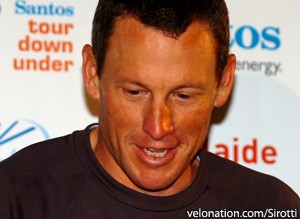Says there’s no difference to Di Luca situation; Texan had previously said he was racing for free
 Having said this week that the Katusha team would have to pay Danilo Di Luca a salary for him to race with the squad, the UCI has confirmed that the same rule applied to Lance Armstrong when he returned to professional cycling in 2009.
Having said this week that the Katusha team would have to pay Danilo Di Luca a salary for him to race with the squad, the UCI has confirmed that the same rule applied to Lance Armstrong when he returned to professional cycling in 2009.
A spokesman for cycling’s governing body told VeloNation today that the Texan was paid by Astana, something which is contrary to public perception at the time.
On Monday, Di Luca announced his comeback after a doping suspension, saying that he had reached a deal with Katusha and would compete without a salary and instead earn performance bonuses when he achieved good results.
However the UCI told VeloNation on Tuesday that this was against its rules. “It’s not possible to be part of a professional team without a salary,” spokesman Enrico Carpani told VeloNation. “Cycling is a professional sport, which did great efforts in the recent past to improve its structure and to protect riders, and no one could be part of it just for free.”
He said that in order for Di Luca to return, the rider must pay a doping-related penalty of €173,000 (corresponding to a portion of his 2009 salary) and then receive at least €33,000 from the team. This is the UCI’s current minimum salary for those competing with ProTeams (a lesser amount is payable to neo-pros), and was introduced in order to avoid a situation where teams underpaid riders.
Katusha later confirmed to VeloNation that it would comply with the requirement if the UCI insisted on it being followed.
The news led to a large reaction on Twitter and elsewhere, with many wondering why the same rule didn’t apply to Lance Armstrong when he returned to competition two years ago.
However, according to UCI spokesman Enrico Carpani, the governing body made the same requirement of Armstrong in relation to taking a salary.
“At the time the UCI asked the same of Lance,” he told VeloNation today. “After checking with Ernst & Young, I can confirm Lance Armstrong had a regular contract and salary with Astana.”
Clarification not given at the time:
When Armstrong announced his comeback, he told Vanity Fair that he wouldn’t take a salary from Astana. “Everybody in cycling has a team and takes a team salary,” he said in a large feature published in September 2008. “I am essentially racing for free. No salary. No bonus. Nothing on the line.… This one’s on the house. And you know what? At the end of the day, I don’t need money.… Not only will I be fine, my kids will be fine, my grandkids will be fine.” This was repeated to other publications in other interviews.
The UCI requirement that he accept a salary was presumably made at some point between then and the start of the season.
In May of that year, five months into the season, Armstrong gave an interview to a small number of media sources including Cycling Weekly. At the time there was great uncertainty about the future of the Astana team as salaries had been unpaid. There was talk that Armstrong and general manager Johan Bruyneel could take over the team, aided by new sponsors.
Armstrong was asked if he would consider covering the wages, but he said that he was racing for free and therefore already putting something into the team. “I’m already investing myself. Not taking a salary is some sort of investment,” he said.
Bruyneel echoed this in his personal blog. “Even if Lance himself does not have to deal with the payment troubles since he rides without a salary, he suffers seeing his team-mates not being paid,” he said at the time.
VeloNation sought clarification from Armstrong or Bruyneel. Neither were available to comment, but a team spokesman has confirmed that he was paid by Astana, as required by the UCI. He said that he received the UCI minimum salary in 2009.